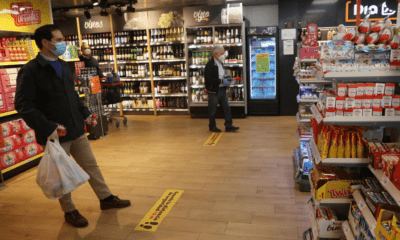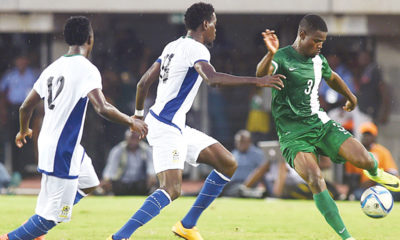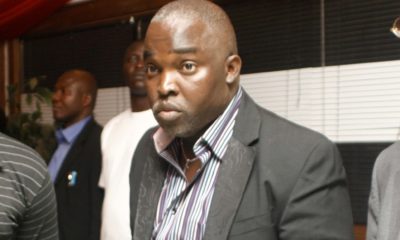Nigerian Newspapers
WORLD PRESS FREEDOM DAY 2013: How safe are Journalists?
World Press Freedom Day is annually observed on May 3 to inform the international community that freedom of the press and freedom of expression are fundamental human rights. This day reminds people that many journalists brave death or face jail to bring daily news to the public. It helps to evaluate press freedom around the world, to defend the media from attacks on their independence and to pay tribute to journalists who have lost their lives in the exercise of their profession.
World Press Freedom Day is a global observance and not a public holiday.
World Press Freedom Day was established by the General Assembly of the United Nations in December 1993 as an outgrowth of the Seminar on Promoting an Independent and Pluralistic African Press. This seminar took place in Namibia in 1991 and led to the adoption of the Windhoek Declaration on Promoting Independent and Pluralistic Media.
The Windhoek Declaration adopted on May 3, 1993 called to establish, maintain and foster an independent, pluralistic and free press. It emphasized the importance of a free press for developing and maintaining democracy in a nation, and for economic development.
It has its root from the United Nations’ Article 19 of the 1948 Universal Declaration on Human Rights that states that everyone “has the right to freedom of opinion and expression; this right includes freedom to hold opinions without interference and to seek, receive and impart information and ideas through any media and regardless of frontiers”.
World Press Freedom Day (WPFD) celebrates its 20th anniversary today with the theme: Safe to Speak: Securing Freedom of Expression in All Media.
WPFD 2013 focuses in particular on the issues of safety of journalists, combating impunity for crimes against freedom of expression, and securing a free and open Internet as the precondition for safety online.
This focus builds upon principles set out in the Medellin Declaration on “Securing the Safety of Journalists and Combating Impunity” which was adopted by the participants of the WPFD held in Colombia in 2007. The Medellin Declaration urges States to comply with the commitments of Resolution 29 adopted by UNESCO’s General Conference in 1997 to combat impunity of crimes against journalists and to comply with Resolution 1738, adopted the year before by the United Nations Security Council, regarding the status of journalists during war. It further calls on news associations to promote actions that secure the safety of journalists.
These developments coincide with the growing awareness that ensuring freedom of expression must also necessarily extend to safety online.
Why should a free press even be up for discussion? Are we failing to get the message across?
The simple answer is that the press equals power, and wherever power lies there are those who seek to control or influence it. By nature, a free press is untamed; capable of speaking unfiltered to public opinion, it has always been a vital conduit for free expression.
It has therefore been a constant target.
As we increasingly embrace our digital citizenship, the tyrants who oppose free speech are quickly learning how to act as digital oppressors. Targets are more numerous, attacks more complicated and diverse. Our awareness and vigilance must adjust with similar voracity.
Impunity for the killers of journalists extends also to those who murder bloggers. Censorship does not discriminate between editorial platforms. Prisons are built for those who “offend”, regardless of media.
Securing the safety of journalists continues to be a challenge due to an upward trend in the killings of journalists, media workers, and social media producers. In 2012 alone, UNESCO’s Director-General condemned the killings of 121 journalists, almost double the annual figures of 2011 and 2010. In addition, there continues to be widespread harassment, intimidation, arbitrary arrest and online attacks on journalists in many parts of the world. To compound the problem, the rate of impunity for crimes against journalists, media workers and social media producers remains extremely high.
Sadly, Nigeria today joined the list of countries where journalists are routinely murdered and assaulted without any convictions for their attackers.
Amid militant sect activity in the north and politically inspired violence across the country, at least five journalists have been murdered due to their work since 2009. None of the cases have been solved. Many more have been attacked.
The Committee for the Protection of Journalists timed the release of its 2013 Impunity Index for World Press Freedom Day, today, as journalists around the world remember reporters, cameramen, researchers and editors who have been killed, injured, imprisoned or harassed for their work.
It is the first time Nigeria has been in the Impunity Index, following a decade or so of relative safety for the media. Many of the attacks are made on those covering the Muslim extremist group Boko Haram. Mr. Enenche Akogwu of Channels Television was shot and killed last year by Boko Haram members when he was interviewing witnesses of a terror attack in the city of Kano. No charges are thought to have been brought despite the incident being in front of a crowd.
In 2012, The Leadership Newspapers photojournalist, Mr Benedict Uwalaka was battered during his work by a Director of TOS Funeral Homes (undertakers), Bayo Ogunsola, and his accomplice. In October 2011, policemen raided the offices of The Nation newspaper in Abuja and Lagos and detained six of its employees. In 2008, operatives of the State Security Service shut down the Channels TV in Lagos over a report the station sourced from the News Agency of Nigeria.
The worst years for journalists in Nigeria were during the military regimes. The founding Editor-in-Chief of Newswatch magazine, Dele Giwa, was killed via a letter bomb in October 1986 during the dictatorship of Ibrahim Babangida. A senior correspondent of TheNews magazine in Kaduna, Bagauda Kaltho, was also killed during the dictatorship of Sani Abacha. Some other Nigerian journalists who have been brutally murdered are Bayo Ohu of The Guardian and Godwin Agbroko of ThisDay. Two Nigerian journalists, Krees Imodibie and Tayo Awotusin, went to cover the Liberian war. They were brutally killed by Charles Taylor and his murderous gang.
The painful aspect of these killings is that the perpetrators act with impunity. Today, the killers of Dele Giwa are still walking the streets free. Nobody has been duly convicted or punished. The same thing goes for the killers of Bagauda Kaltho. Up until now, nobody has been brought to justice for that barbarity.
In a statement in Lagos, the Nigerian Guild of Editors, NGE regretted that successive administrations in Nigeria had treated the media with suspicion, instead of regarding it as an ally in national development.
The statement by the President of the guild, Mr Femi Adesina, noted that Nigeria’s robust and vibrant media had a history of commitment to noble causes, and played key roles in the struggle for independence, democratic rule, social justice and human rights.
“Today, the media is still in the vanguard of upholding all that is noble, just, fair and would rebound to the progress of the nation. We urge the government to resist anything that might bear the slightest semblance to a curtailment of the freedom of the press. The media parades professionals, who are passionate and committed to the growth and development of the country on all fronts, and they do not deserve to be hounded, repressed or harassed. If there are inadvertent infractions of the rules, we expect nothing but the strictest form of conformity to due process and the rule of law in addressing such. The line between press freedom and repression is quite thin, and eternal vigilance is needed at all times,”
Our right to seek, receive or impart information through any media may be enshrined in international human rights law, yet the media must fight daily to remain a bulwark against intrusions on free speech. As a check on power, an independent press acts as society’s window through which the abuses, digressions, untruths and self-interests of the powerful are revealed for public scrutiny.
According to corrupt governments, violent criminals, and fundamentalists of every description, this window would be better permanently bricked-up.
Wherever you live, whatever you do, pause for a moment and reflect on what kind of a society would be in front of you, were it not for the presence of an inquisitive media.
Who makes decisions on your behalf, and just how transparent is the process?
Above all, with a sense of solemn reflection, 3 May is an occasion to remember colleagues targeted for their work, especially those killed in the line of duty.
That ‘duty’ was not simply to bring us the news. Their work – by nature risky, sometimes dangerous, yet always outspoken – went beyond the headlines that became unintentional obituaries. Their work signifies a belief in a principle, exhorted by democracy and made tangible with every article, picture or broadcast.
It is that principle behind which we stand proud. It is upon that principle that our industry is founded, and that journalism thrives.
————————————————————————————————————————-
Posted in Nigerian Newspapers. A DisNaija.Com network.
Source: The Nation Newspaper
DisNaija.Com publishes regular posts on Nigeria News, Nigerian Newspapers, Online Nigeria Gist.
Follow us on Twitter and Facebook.
Nigerian Newspapers
Follow @Dis_Naija
Your Opinion Counts. Be sure To Leave A Comment, If You Have Any.
Please Like, Share or Tweet. Your Support Is Appreciated.
This Day
Military, Police Ring Abuja to Forestall Boko Haram Attack
•Deploy more personnel as army chief vows to wipe out terror group
•Security beefed up at N’Assembly
Deji Elumoye and Kingsley Nwezeh in Abuja
Abuja, Nigeria’s seat of power, is under a massive security cordon following threats of attacks by insurgents and the increasing wave of banditry in the contiguous states of Kaduna, Kogi, Nasarawa and Niger States, THISDAY’s investigation has revealed.
There has been a wave of kidnappings in the outskirts of the federal capital, notably Pegi, Tuganmaje and Kuje among others, which the police have battled in recent times.
The security situation in and around the Federal Capital Territory (FCT) was heightened by the pronouncement of the Niger State Governor, Mr. Sani Bello, that Boko Haram fighters who he said sacked 50 villages in the state and hoisted the terror group’s flag, were about two hours drive away from the FCT.
Security has also been beefed up at the National Assembly as operatives, yesterday, thoroughly screened every vehicle approaching the National Assembly complex in Abuja.
The deteriorating security situation nationwide prompted the National Chairman of the Peoples Democratic Party (PDP), Prince Uche Secondus, to warn that the 2023 general election may not hold, demanding the declaration of a state of emergency as well as the convocation of a national conference.
However, the Chief of Army Staff, Lt. Gen. Ibrahim Attahiru, yesterday restated the Nigerian Army’s determination to annihilate Boko Haram.
But the Governor of Katsina State, Hon. Bello Masari, cautioned against declaring a state of emergency, saying doing so isn’t the solution to combat the security challenges facing the country.
The security of the nation’s airports was also in focus yesterday as the Office of the National Security Adviser (ONSA) said there was no threat to them.
THISDAY’s investigations showed increased presence of troops, police, Nigerian Security and Civil Defence Corps (NSCDC) personnel and intelligence operatives at the three strategic entrances to the city notably, Keffi, Zuba and Gwagwalada.
More checkpoints were also mounted around Gwagwalada and Keffi.
THISDAY also observed increased intelligence deployment at the entrance and the borders of FCT with contiguous states.
Beyond the borders, there were more deployments and police patrols inside the city and increased intelligence deployments as well.
Security sources told THISDAY: “There are deployments here and there but they are routine. Alertness is key to a secure environment.”
It was also learnt that security agencies were involved in frenzied meetings throughout yesterday.
The meetings, coordinated by the office of the Chief of Defence Staff under the new joint operational strategy of the armed forces, were aimed at coordinating a joint response to possible threats of attack to the FCT.
“I understand the security teams have been meeting for some days now and if you look around you, you will notice that there are increasing patrols and numbers of security personnel. The threats are not been taken lightly,” a source said.
National Assembly workers, lawmakers and visitors also had a harrowing experience accessing the legislative complex due to heightened security in the area.
Security operatives thoroughly screened every vehicle approaching the National Assembly complex in Abuja, impeding both human and vehicular traffic.
The Sergeant-at-arm of the National Assembly and other security agencies supervised the operations, leading to huge traffic build-up inside the complex.
Legislative staff, visitors and lawmakers were seen patiently waiting for their cars to be searched so that they could go ahead with the business of the day.
Some staff and visitors at some point got tired of waiting and were seen alighting from their cars to trek from the gate to the complex.
Meanwhile, the ONSA has said there is no threat to the nation’s airports.
A statement by the Head of Strategic Communication, Mr. Zachari Usman, said the reports of threats to the airports were an internal correspondence of security threat assessment misconstrued as security threat to the airports.
PDP Demands State of Emergency
In a related development, the PDP National Chairman, Prince Uche Secondus, yesterday demanded the declaration of a state of emergency, warning that the 2023 general election might not hold if the federal government failed to tackle insecurity.
He called on the federal government to summon a national conference to address the spike in insecurity.
Secondus added that the national caucus of the party will meet today to discuss the state of the nation.
Addressing members of the National Executive Committee (NEC) in Abuja, Secondus said: “We are worried Abuja is not even safe. It is no longer politics. We got alert of plots to bomb and burn down our airports.
“We urge the federal government to declare a national state of emergency in security. There is the need to call a national conference to discuss the insecurity in the country.
“There may not be any election in 2023 in Nigeria due to insecurity. This government must listen to the people. The Buhari government should call a national confab to discuss security and state of the nation. It is no longer politics. This time we are not playing politics. Let’s keep politics aside and move the nation forward.”
He said the country had been grounded, regretting that there had been no matching response from the federal government.
Secondus said in the past, terrorism in the North was confined to the North-east, but with the report of Boko Haram occupying villages in Niger State, terrorism had spread to the North-central
“Herdsmen are also menacing in the West; gunmen causing havoc in the East; and the militants in the South; all killing, looting, raping, maiming and burning down homes. The situation is bad; Nigerians all over are living in fear,” he said.
The Senate Minority Leader, Senator Enyinnaya Abaribe, said the problem of Nigeria was outside of the PDP headquarters, while pledging the support of the Senate to the declaration of state of emergency in security.
Abaribe said he deliberately decided not to speak on the floor of the Senate but to allow the APC senators to speak so as to avoid being accused of giving a partisan colouration to the issue of insecurity.
He stated that only electoral reforms would give victory to the opposition party in the 2023 general election and ensure a democratic defeat of the APC-led federal government.
Also, the Minority Leader of the House of Representatives, Hon. Ndudi Elumelu, commended the NEC and the PDP leadership for their collective efforts at resolving the House leadership crisis.
The NEC meeting adopted the position of Secondus, calling on the federal government to convoke a national conference to discuss the state of insecurity in the country, according to a communiqué read by the National Publicity Secretary, Mr. Kola Ologbondiyan.
Army Chief Vows to Wipe Out Boko Haram
The army yesterday reiterated its commitment to wipe out Boko Haram.
Chief of Army Staff (COAS), Lt. Gen. Ibrahim Attahiru, told reporters in Maiduguri, Borno State that Boko Haram had been defeated in many encounters and would continue to be defeated until it’s annihilated from Nigeria.
“We will take on Boko Haram decisively, and we are committed to the focus of the operations, which is the total annihilation of Boko Haram from Nigeria,” he said.
The COAS, who was visiting the headquarters of Operation Lafiya Dole in Maiduguri for the fifth time since his appointment four months ago, said the visit was to boost the morale of the troops, reassure them and listen to any issues affecting them.
Earlier, the Theatre Commander of Operation Lafiya Dole, Maj. Gen. Farouq Yahaya, lauded the visit, which he said had continued to boost the morale of the troops.
“We are honoured, we are grateful, we are encouraged by those visits. You provided us guidance, logistics and other things we required. We are most grateful for those visits,” Yahaya said.
State of Emergency Won’t Solve Security Challenges, Says Masari
Katsina State Governor, Hon. Aminu Masari, has, however, said declaration of a state of emergency won’t solve the security challenges facing the nation.
Masari, who spoke yesterday with journalists after meeting with the Chief of Staff to the President, Prof. Ibrahim Gambari at the State House, Abuja stated that he was against the recent call by the House of Representatives for the declaration of a state of emergency in the security sector as it would not solve the problem.
According to him, declaring a state of emergency will not achieve the desired effect as the security structure and personnel to be used to execute the emergency are already overstretched in a bid to safeguard lives and property.
Sourced From: THISDAYLIVE
Tribune
Nigeria records 55 new COVID-19 infections, total now 165,110
Tribune Online
Nigeria records 55 new COVID-19 infections, total now 165,110
The Nigeria Centre for Disease Control (NCDC) has recorded 62 new cases of COVID-19, bringing the total number of infections in the country to 165,110. The NCDC disclosed this on its official Twitter handle on Friday. “55 new cases of #COVID19Nigeria; Lagos-21, Yobe-19, Ogun-6, Akwa Ibom-3, Kaduna-2, Plateau-2, FCT-1, Rivers-1.” YOU SHOULD NOT MISS THESE HEADLINES FROM NIGERIAN TRIBUNE COVID-19: Nigeria Recorded […]
Nigeria records 55 new COVID-19 infections, total now 165,110
Tribune Online
Sourced From: Tribune Online
Vanguard
Attacks on S’East: We must explore all options of negotiation — Stakeholders urge Igbo

By Olasunkanmi Akoni
The people of the South East region have been urged to explore the power of negotiation and mutual settlement in the face of ongoing killings and security challenges in the zone because the east can not afford another war at present.
Stakeholders from the South-East geo-political zone made the remark on Thursday, at the unveiling of the book, “Igbo, 50 years after Biafra,” written by Special Adviser to Lagos State Governor Babajide Sanwo-Olu on Drainage Services, Joe Igbokwe, held at Ikeja G.R.A.
Speaking at the unveiling of the book, the chairman of the occasion, Mr. Cutis Adigba,
urged the people of the South-East to learn to build bridges across the country, so that they can realise their ambition of producing the next president of Nigeria.
Adigba urged leaders from the zone to discourage the move and agitation by some youths in the South East to go to war and secede out of Nigeria.
Also read: Banditry: Disregard viral video, Niger State gov’t urges residents
He said that Igbo have always found it difficult to rule Nigeria because they refused to build bridges across the six geo-political zones that made up Nigeria.
While describing the agitation as uncalled for, Adigba noted that after two decades that Nigeria returned to civil rule, the Igbo has predominantly identified with only one political party.
He maintained that remaining in one party can not advance the cause of the people of South East and cannot make them realise their objective of producing an Igbo man as president.
He maintained that the publisher of the book, Igbokwe played politics outside his state, so that the Igbo race can be integrated with one another race.
Adigba said the failure of the Igbo to reintegrate with other ethnic nationalities politically was responsible for the retrogression of the race in Nigerian politics.
Igbokwe, also addressing guests on the occasion, maintained that the Igbo are not advancing politically because they refused to be integrated into National politics, lamenting that, despite their success in business, they are not successful in playing politics at the national level.
Corroborating Dimgba, Igbokwe noted that there was the need for the Igbo people to stand up and build bridges so that their objective of producing the next president of Nigeria could be realised.
According to him: “I have decided to raise my voice, I hope my people will hear me while trying to quell the effect of the war, our people are spoiling for another war, mayhem is being unleashed in Igbo land, and there is palpable fear.
“Those who could speak have lost their voice, mindful of the consequences of their actions, I am calling on all Igbo leaders to speak up because all actions carry consequences, consequences of the silence will be too dastardly to sustain.
“Those silently supporting the wild wind should be careful or else they hand over to their children,” he said.
Igbokwe urged those spoiling for war to jettison their plan and embrace dialogue, urging them to learn from the South West region that despite the challenges faced after the annulment of the June 12, 1993, election, they did not go to war, and the region had the opportunity of producing two of her sons for presidential position in 1999.
“You have to build bridges to become president of Nigeria, but it is unfortunate the Igbo are burning bridges.”
Speaking at the event, Chief Uche Dimgba who is the coordinator of Igbo in All Progressives Congress, APC in Lagos, described Igbokwe as “a Frank, fearless and reliable leader, who based his views on issues and stand by his opinions, and we the Igbo have confidence in him and believe he can lead us aright.”
“He is a leader we Igbo believe in and we will follow him. If he can serve all the governors produced in Lagos State since 1999, he is a better man to follow because he possesses all the experience that can be of benefit to Igbo both at home and in the diaspora.”
The post Attacks on S’East: We must explore all options of negotiation — Stakeholders urge Igbo appeared first on Vanguard News.
Sourced From: Vanguard News
Premium Times
Insecurity: Lagos bans occupation of abandoned buildings
The government said that no worker should stay back beyond 6:00 p.m. within premises of buildings undergoing construction.
The post Insecurity: Lagos bans occupation of abandoned buildings appeared first on Premium Times Nigeria.
Sourced From: Premium Times Nigeria
























